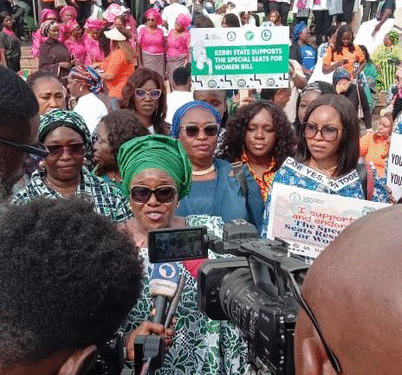Hundreds of women took to the streets of Abuja on Monday, demanding the passage of a bill that would guarantee women-only seats in Nigeria’s Senate and House of Representatives.

The proposed legislation, known as the “Special Seats Bill”, seeks to reserve one additional seat for women in both chambers of the National Assembly from each of the country’s 36 states and the Federal Capital Territory. If passed, the move would require a constitutional amendment.

Currently, Nigeria lags far behind many African countries in female political representation. Out of 109 senators, only four are women, while just 16 out of 360 lawmakers in the House of Representatives are female, according to the Policy and Legal Advocacy Centre (PLAC). By contrast, countries such as Rwanda and Senegal have significantly boosted women’s representation through quota systems.
“We want the legislature to work for women,” said activist Dorothy Njemanze, who estimated that more than 1,000 women participated in the demonstration.
Women’s groups from across the nation arrived in Abuja in a colourful caravan of buses, vans, and a music truck blasting Afrobeats. The procession wound through the capital’s wide boulevards before culminating at the National Assembly, where protesters submitted signed petitions in support of the bill to a constitutional review committee.
Advocates argue that reserved seats are necessary to break down systemic barriers—ranging from financial constraints and entrenched gender norms to the dominance of male political power brokers—that keep women excluded from leadership.
“I want that seat, because tomorrow I may be the one contesting for it,” said Onu Ihunania, a 50-year-old civil servant who joined the protest.
Others highlighted the potential impact of greater female representation. “A National Assembly with more women might better focus on women’s health and economic inclusion,” said Nyiyam Ikyereve, who travelled from Benue State to attend.

Women’s Affairs Minister Hajiya Imaan Sulaiman-Ibrahim has expressed support for the legislation, but analysts warn that passing the bill will be challenging. Constitutional amendments require approval by two-thirds of the National Assembly as well as endorsement from at least 24 state legislatures.
Similar efforts to create women’s reserved seats have failed in the past, underscoring the uphill battle ahead.
The debate over women’s representation has intensified in recent months, following the suspension of Senator Natasha Akpoti-Uduaghan, who was barred from the chamber after raising concerns about sexual harassment.
Despite the hurdles, organisers say the movement is gaining momentum and represents a critical step toward gender parity in Africa’s most populous nation.









